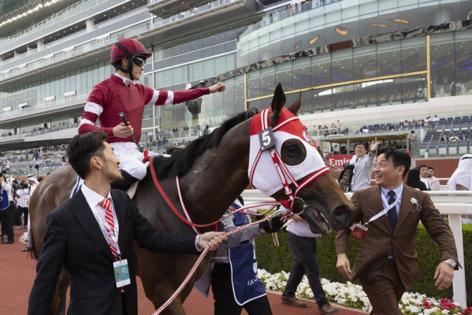Bryce Miller: Japan's rise at Breeders' Cup tied to winning runs at Del Mar in 2021
Published in Horse Racing
DEL MAR, Calif. — The last time Japanese horses came to Del Mar for the 2021 Breeders’ Cup, they made a sizable dent in American racing with two breakthrough wins.
On their return, they just might be swinging a sledgehammer.
The country patiently and successfully groomed the sport since Kentucky Derby and Preakness Stakes winner Sunday Silence was exported to Japan after his racing retirement in 1990.
The robust bloodline and dominoes that tumbled afterward jump-started a run that has led to wins in the richest races in the world, the first victories ever at the Breeders’ Cup and a near miss at the Derby, the American crown jewel, in May.
In 2022, the country entered one horse in the Breeders’ Cup at Keeneland in Kentucky. Last year, that number jumped to a record eight bursting from the gate at Santa Anita.
Now, 19 are entered in the two-day event awarding $30 million in purses across 14 world championship races beginning Friday at Del Mar racetrack.
What began as a persistent trickle has grown into an undeniable international flood.
“I don’t think they’re on the verge of breaking through,” said NBC analyst and Hall of Fame jockey Jerry Bailey. “They already have.”
The most recognizable star among the group is Forever Young in Saturday’s $7 million Breeders’ Cup Classic.
The horse, guided by the country’s legendary trainer Yoshito Yahagi, finished third at the Derby by a pair of noses behind Mystik Dan and Sierra Leone. T O Password, another Japanese horse, finished fifth.
Yahagi wrestled away headlines at Del Mar in 2021 with his country’s first two wins at the global event. He sprinted into the winner’s circle with March Lorraine in the Distaff and Loves Only You in the Filly & Mare Turf.
The nation owned an 0-13 record in Breeders’ Cup races when they arrived at Del Mar.
If the American door is not fully kicked in, it’s hanging by the straining hinges.
“The two wins in 2021 at the Breeders’ Cup was the biggest reason (for the unprecedented entries),” Yahagi said via interpreter Mariko Seki alongside a backstretch barn. “(And) finishing close in the Kentucky Derby proved that the Japanese horses can handle the dirt and compete in top-level American races.
“That motivated owners and trainers a lot.”
Yahagi and others also pointed to the easier travel from Japan to the West Coast, compared with destinations like Churchill Downs, Keeneland, New York or Florida.
Stir in some success on the most recent visit and Del Mar, which will host the event again in 2025, suddenly has blossomed into a favorite U.S. target.
“They’ve improved their overall game, whether that’s through pedigrees or training methods, all of those things,” top American trainer Todd Pletcher said. “They’ve just gotten better and better, stronger and stronger.
“The success they’ve had internationally has made that apparent.”
The ripples of the Japanese banking on the bloodline of Sunday Silence, a Breeders’ Cup Classic winner, cannot be overstated. Current Classic qualifiers Forever Young, Ushba Tesoro and Derma Sotogake all trace back to the iconic American horse.
It was a roll of the dice by the Japanese that caught U.S. decision-makers napping.
“The real meteoric rise was when the Japanese purchased Sunday Silence,” NBC analyst Randy Moss said. “The American breeders for some reason did not highly value Sunday Silence and they let him get away.
“It’s probably the single biggest oversight in the American breeding industry in the last 50 years. That horse has had a massive impact.”
The rise goes beyond savvy bloodlines.
The Japanese realized that competing around the world meant arming themselves for different surfaces and building training regimens uniquely.
“Japanese training facilities have various tracks like turf, dirt, etc.,” Yahagi said. “Mainly, I used an uphill course at the training center. That’s the big difference from the American style.”
Moss said results on the international stage tell the tale, pointing to the 20 Japanese horses who finished first or second at the Dubai World Cup across the last 27 races during that event.
“This has been coming for a long time,” he said. “What they’re doing with breeding, raising horses and training them, it’s working very well. I know for a fact that American breeders, trainers and owners are paying attention.”
Yahagi and Moss both said it would be reasonable for the Japanese to win two or three races this weekend at Del Mar.
Pletcher smiled when asked whether he sees the country aiming for more premier races in the United States.
“Unfortunately,” he said. “I do.”
With a sledgehammer at the ready.
©2024 The San Diego Union-Tribune. Visit sandiegouniontribune.com. Distributed by Tribune Content Agency, LLC.







Comments